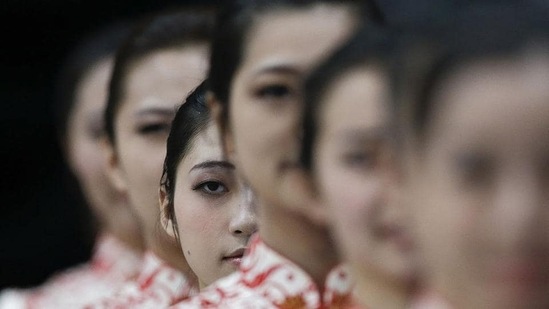Attack on Chinese women revives #MeToo anger that Xi can’t extinguish
Security footage shared online shows a man approaching a table of three female diners early Friday morning in the northern city of Tangshan and putting his hand on one woman’s back.
Footage of a violent attack on female diners at a barbecue restaurant in China has sparked outrage online, threatening to revive the #MeToo movement against gender inequality that President Xi Jinping’s government has repeatedly tried to suppress.

Security footage shared online shows a man approaching a table of three female diners early Friday morning in the northern city of Tangshan and putting his hand on one woman’s back. When she resists, the man attacks her and a friend, and several other men pile in. The woman is then dragged outside by her hair, where she’s beaten and kicked on the ground.
Nine suspects were arrested Saturday after a search spanning two provinces, according to the official Xinhua News Agency, with a Tangshan official vowing to “severely punish” those involved.
Also read: China restaurant attack sparks outcry over violence against women
That pledge didn’t satisfy users of China’s Twitter-like Weibo, where the assault was still trending Monday morning and becoming a broader conversation about gender inequality. One woman demanded an apology from a man she said harassed her on a beach in 2021. “Since then, I no longer dare to leave home alone at night,” she wrote, in a post that received more than 1 million likes.
Two members of girl band CKG48 shared a video of being forced to accept a toast from a man after polite refusals. That topic was viewed some 26 million times.
Despite that outrage, the state-run China Daily newspaper dismissed the idea the attack exposed any problem with women’s rights in a Sunday commentary. The case “should never be interpreted as any form of sexual antagonism,” the newspaper said.
Xiaowen Liang, a New York-based feminist and lawyer, said that by denying this was gender-based violence, Chinese authorities were trying to avoid addressing a systemic problem.
“Women’s voices in Chinese society are some of the strongest and loudest outspoken voices that are constantly challenging the existing system,” Liang said. “That’s why the Chinese government is trying everything it can to try to marginalize women’s voices, or dissenting feminist ideas, and trying to stigmatize feminism as a whole.”
The ruling Communist Party has repeatedly suppressed the country’s nascent #MeToo movement, viewing it as a vehicle for spreading liberal Western values. Consequently, women who have spoken about up sexual assault have been repeatedly silenced by the nation’s patriarchal culture. There’s only one woman in its 25-member top decision making body, the Politburo, and she’s set to retire this year.
Alibaba Group Holding Ltd. fired a woman who accused a manager of sexual assault last year, a scandal that ignited intense debate about the excessive drinking perpetuated by Chinese corporations and discrimination against females at tech firms.
Women’s rights also threatened to overshadow the Beijing Winter Olympics in February, as international coverage of multiple scandals marred Xi’s final major international event before his landmark bid to secure a third term in office later this year.
Also read: Japan exploring counter-strike option sends ripples in China
Concern for tennis star Peng Shuai prompted the United Nations Human Rights Office, the White House and high-profile sports stars including Serena Williams to issue statements demanding China clarify her whereabouts in the Olympics run-up. Peng disappeared from public view after making allegations against a former vice premier that were promptly wiped from China’s internet.
Weeks later, authorities in the eastern province of Jiangsu were accused of downplaying the case of a mother of eight filmed chained by the neck in a doorless hut. Chinese censors removed a letter signed by 100 alumni of Peking University calling for the central government to look into the matter, which shone a spotlight on the problem of bride trafficking in rural areas.
Yaqiu Wang, senior researcher on China at Human Rights Watch, said the Tangshan attack had sparked such anger online because so many Chinese women have pent-up frustration about a lack of public safety for them and the impunity for attackers.
“Authorities need to investigate gender-based violence, enforce laws and hold perpetrators of assault and harassment to account,” she said. “They should also stop censoring online discussions about women’s rights issues, cease harassing or intimidating women’s rights activists and allow an independent press to report on these issues.”






